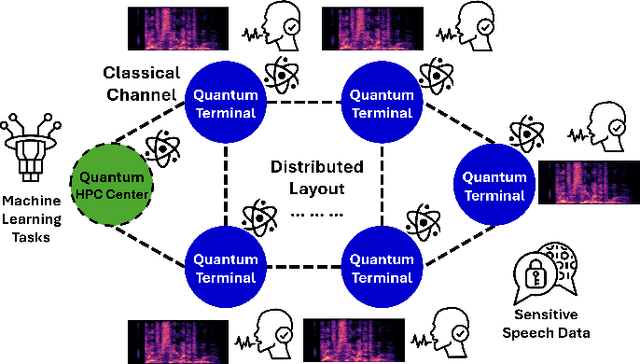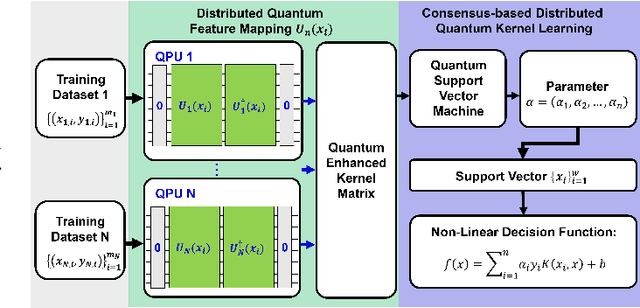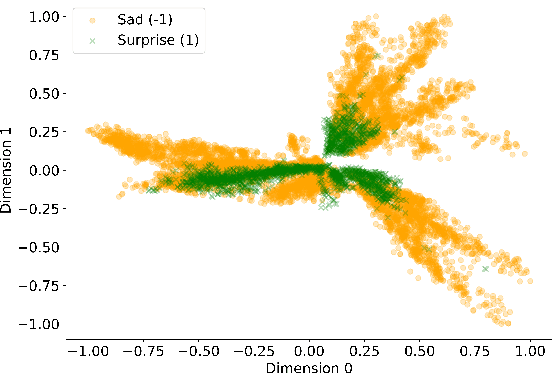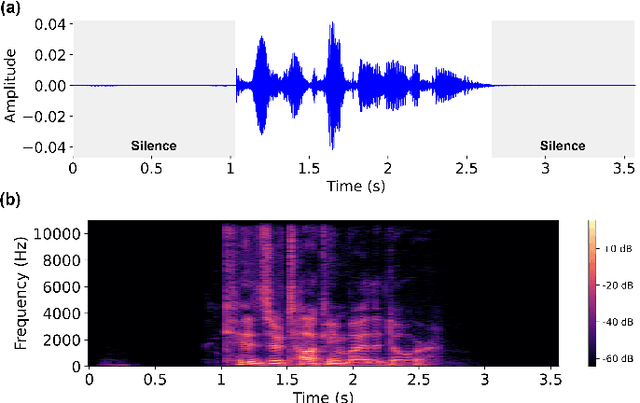Kuan-Cheng Chen
Henry
Quantum-Enhanced Parameter-Efficient Learning for Typhoon Trajectory Forecasting
May 14, 2025



Abstract:Typhoon trajectory forecasting is essential for disaster preparedness but remains computationally demanding due to the complexity of atmospheric dynamics and the resource requirements of deep learning models. Quantum-Train (QT), a hybrid quantum-classical framework that leverages quantum neural networks (QNNs) to generate trainable parameters exclusively during training, eliminating the need for quantum hardware at inference time. Building on QT's success across multiple domains, including image classification, reinforcement learning, flood prediction, and large language model (LLM) fine-tuning, we introduce Quantum Parameter Adaptation (QPA) for efficient typhoon forecasting model learning. Integrated with an Attention-based Multi-ConvGRU model, QPA enables parameter-efficient training while maintaining predictive accuracy. This work represents the first application of quantum machine learning (QML) to large-scale typhoon trajectory prediction, offering a scalable and energy-efficient approach to climate modeling. Our results demonstrate that QPA significantly reduces the number of trainable parameters while preserving performance, making high-performance forecasting more accessible and sustainable through hybrid quantum-classical learning.
Distributed Quantum Neural Networks on Distributed Photonic Quantum Computing
May 13, 2025Abstract:We introduce a distributed quantum-classical framework that synergizes photonic quantum neural networks (QNNs) with matrix-product-state (MPS) mapping to achieve parameter-efficient training of classical neural networks. By leveraging universal linear-optical decompositions of $M$-mode interferometers and photon-counting measurement statistics, our architecture generates neural parameters through a hybrid quantum-classical workflow: photonic QNNs with $M(M+1)/2$ trainable parameters produce high-dimensional probability distributions that are mapped to classical network weights via an MPS model with bond dimension $\chi$. Empirical validation on MNIST classification demonstrates that photonic QT achieves an accuracy of $95.50\% \pm 0.84\%$ using 3,292 parameters ($\chi = 10$), compared to $96.89\% \pm 0.31\%$ for classical baselines with 6,690 parameters. Moreover, a ten-fold compression ratio is achieved at $\chi = 4$, with a relative accuracy loss of less than $3\%$. The framework outperforms classical compression techniques (weight sharing/pruning) by 6--12\% absolute accuracy while eliminating quantum hardware requirements during inference through classical deployment of compressed parameters. Simulations incorporating realistic photonic noise demonstrate the framework's robustness to near-term hardware imperfections. Ablation studies confirm quantum necessity: replacing photonic QNNs with random inputs collapses accuracy to chance level ($10.0\% \pm 0.5\%$). Photonic quantum computing's room-temperature operation, inherent scalability through spatial-mode multiplexing, and HPC-integrated architecture establish a practical pathway for distributed quantum machine learning, combining the expressivity of photonic Hilbert spaces with the deployability of classical neural networks.
Learning to Learn with Quantum Optimization via Quantum Neural Networks
May 01, 2025Abstract:Quantum Approximate Optimization Algorithms (QAOA) promise efficient solutions to classically intractable combinatorial optimization problems by harnessing shallow-depth quantum circuits. Yet, their performance and scalability often hinge on effective parameter optimization, which remains nontrivial due to rugged energy landscapes and hardware noise. In this work, we introduce a quantum meta-learning framework that combines quantum neural networks, specifically Quantum Long Short-Term Memory (QLSTM) architectures, with QAOA. By training the QLSTM optimizer on smaller graph instances, our approach rapidly generalizes to larger, more complex problems, substantially reducing the number of iterations required for convergence. Through comprehensive benchmarks on Max-Cut and Sherrington-Kirkpatrick model instances, we demonstrate that QLSTM-based optimizers converge faster and achieve higher approximation ratios compared to classical baselines, thereby offering a robust pathway toward scalable quantum optimization in the NISQ era.
Toward Large-Scale Distributed Quantum Long Short-Term Memory with Modular Quantum Computers
Mar 18, 2025Abstract:In this work, we introduce a Distributed Quantum Long Short-Term Memory (QLSTM) framework that leverages modular quantum computing to address scalability challenges on Noisy Intermediate-Scale Quantum (NISQ) devices. By embedding variational quantum circuits into LSTM cells, the QLSTM captures long-range temporal dependencies, while a distributed architecture partitions the underlying Variational Quantum Circuits (VQCs) into smaller, manageable subcircuits that can be executed on a network of quantum processing units. We assess the proposed framework using nontrivial benchmark problems such as damped harmonic oscillators and Nonlinear Autoregressive Moving Average sequences. Our results demonstrate that the distributed QLSTM achieves stable convergence and improved training dynamics compared to classical approaches. This work underscores the potential of modular, distributed quantum computing architectures for large-scale sequence modelling, providing a foundation for the future integration of hybrid quantum-classical solutions into advanced Quantum High-performance computing (HPC) ecosystems.
Quantum-Train-Based Distributed Multi-Agent Reinforcement Learning
Dec 12, 2024


Abstract:In this paper, we introduce Quantum-Train-Based Distributed Multi-Agent Reinforcement Learning (Dist-QTRL), a novel approach to addressing the scalability challenges of traditional Reinforcement Learning (RL) by integrating quantum computing principles. Quantum-Train Reinforcement Learning (QTRL) leverages parameterized quantum circuits to efficiently generate neural network parameters, achieving a \(poly(\log(N))\) reduction in the dimensionality of trainable parameters while harnessing quantum entanglement for superior data representation. The framework is designed for distributed multi-agent environments, where multiple agents, modeled as Quantum Processing Units (QPUs), operate in parallel, enabling faster convergence and enhanced scalability. Additionally, the Dist-QTRL framework can be extended to high-performance computing (HPC) environments by utilizing distributed quantum training for parameter reduction in classical neural networks, followed by inference using classical CPUs or GPUs. This hybrid quantum-HPC approach allows for further optimization in real-world applications. In this paper, we provide a mathematical formulation of the Dist-QTRL framework and explore its convergence properties, supported by empirical results demonstrating performance improvements over centric QTRL models. The results highlight the potential of quantum-enhanced RL in tackling complex, high-dimensional tasks, particularly in distributed computing settings, where our framework achieves significant speedups through parallelization without compromising model accuracy. This work paves the way for scalable, quantum-enhanced RL systems in practical applications, leveraging both quantum and classical computational resources.
Quantum Kernel-Based Long Short-term Memory
Nov 20, 2024



Abstract:The integration of quantum computing into classical machine learning architectures has emerged as a promising approach to enhance model efficiency and computational capacity. In this work, we introduce the Quantum Kernel-Based Long Short-Term Memory (QK-LSTM) network, which utilizes quantum kernel functions within the classical LSTM framework to capture complex, non-linear patterns in sequential data. By embedding input data into a high-dimensional quantum feature space, the QK-LSTM model reduces the reliance on large parameter sets, achieving effective compression while maintaining accuracy in sequence modeling tasks. This quantum-enhanced architecture demonstrates efficient convergence, robust loss minimization, and model compactness, making it suitable for deployment in edge computing environments and resource-limited quantum devices (especially in the NISQ era). Benchmark comparisons reveal that QK-LSTM achieves performance on par with classical LSTM models, yet with fewer parameters, underscoring its potential to advance quantum machine learning applications in natural language processing and other domains requiring efficient temporal data processing.
Quantum-Trained Convolutional Neural Network for Deepfake Audio Detection
Oct 11, 2024



Abstract:The rise of deepfake technologies has posed significant challenges to privacy, security, and information integrity, particularly in audio and multimedia content. This paper introduces a Quantum-Trained Convolutional Neural Network (QT-CNN) framework designed to enhance the detection of deepfake audio, leveraging the computational power of quantum machine learning (QML). The QT-CNN employs a hybrid quantum-classical approach, integrating Quantum Neural Networks (QNNs) with classical neural architectures to optimize training efficiency while reducing the number of trainable parameters. Our method incorporates a novel quantum-to-classical parameter mapping that effectively utilizes quantum states to enhance the expressive power of the model, achieving up to 70% parameter reduction compared to classical models without compromising accuracy. Data pre-processing involved extracting essential audio features, label encoding, feature scaling, and constructing sequential datasets for robust model evaluation. Experimental results demonstrate that the QT-CNN achieves comparable performance to traditional CNNs, maintaining high accuracy during training and testing phases across varying configurations of QNN blocks. The QT framework's ability to reduce computational overhead while maintaining performance underscores its potential for real-world applications in deepfake detection and other resource-constrained scenarios. This work highlights the practical benefits of integrating quantum computing into artificial intelligence, offering a scalable and efficient approach to advancing deepfake detection technologies.
CompressedMediQ: Hybrid Quantum Machine Learning Pipeline for High-Dimentional Neuroimaging Data
Sep 13, 2024



Abstract:This paper introduces CompressedMediQ, a novel hybrid quantum-classical machine learning pipeline specifically developed to address the computational challenges associated with high-dimensional multi-class neuroimaging data analysis. Standard neuroimaging datasets, such as 4D MRI data from the Alzheimer's Disease Neuroimaging Initiative (ADNI) and Neuroimaging in Frontotemporal Dementia (NIFD), present significant hurdles due to their vast size and complexity. CompressedMediQ integrates classical high-performance computing (HPC) nodes for advanced MRI pre-processing and Convolutional Neural Network (CNN)-PCA-based feature extraction and reduction, addressing the limited-qubit availability for quantum data encoding in the NISQ (Noisy Intermediate-Scale Quantum) era. This is followed by Quantum Support Vector Machine (QSVM) classification. By utilizing quantum kernel methods, the pipeline optimizes feature mapping and classification, enhancing data separability and outperforming traditional neuroimaging analysis techniques. Experimental results highlight the pipeline's superior accuracy in dementia staging, validating the practical use of quantum machine learning in clinical diagnostics. Despite the limitations of NISQ devices, this proof-of-concept demonstrates the transformative potential of quantum-enhanced learning, paving the way for scalable and precise diagnostic tools in healthcare and signal processing.
Consensus-based Distributed Quantum Kernel Learning for Speech Recognition
Sep 09, 2024



Abstract:This paper presents a Consensus-based Distributed Quantum Kernel Learning (CDQKL) framework aimed at improving speech recognition through distributed quantum computing.CDQKL addresses the challenges of scalability and data privacy in centralized quantum kernel learning. It does this by distributing computational tasks across quantum terminals, which are connected through classical channels. This approach enables the exchange of model parameters without sharing local training data, thereby maintaining data privacy and enhancing computational efficiency. Experimental evaluations on benchmark speech emotion recognition datasets demonstrate that CDQKL achieves competitive classification accuracy and scalability compared to centralized and local quantum kernel learning models. The distributed nature of CDQKL offers advantages in privacy preservation and computational efficiency, making it suitable for data-sensitive fields such as telecommunications, automotive, and finance. The findings suggest that CDQKL can effectively leverage distributed quantum computing for large-scale machine-learning tasks.
Quantum Computing for Climate Resilience and Sustainability Challenges
Jul 23, 2024


Abstract:The escalating impacts of climate change and the increasing demand for sustainable development and natural resource management necessitate innovative technological solutions. Quantum computing (QC) has emerged as a promising tool with the potential to revolutionize these critical areas. This review explores the application of quantum machine learning and optimization techniques for climate change prediction and enhancing sustainable development. Traditional computational methods often fall short in handling the scale and complexity of climate models and natural resource management. Quantum advancements, however, offer significant improvements in computational efficiency and problem-solving capabilities. By synthesizing the latest research and developments, this paper highlights how QC and quantum machine learning can optimize multi-infrastructure systems towards climate neutrality. The paper also evaluates the performance of current quantum algorithms and hardware in practical applications and presents realistic cases, i.e., waste-to-energy in anaerobic digestion, disaster prevention in flooding prediction, and new material development for carbon capture. The integration of these quantum technologies promises to drive significant advancements in achieving climate resilience and sustainable development.
 Add to Chrome
Add to Chrome Add to Firefox
Add to Firefox Add to Edge
Add to Edge